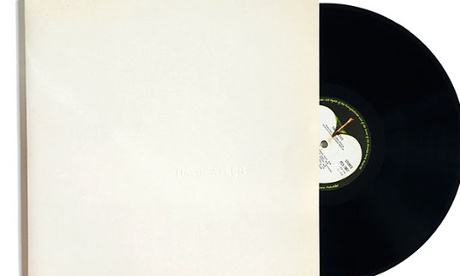The Wilco loft is situated in a broad, pale-bricked warehouse, repurposed into offices for tech companies and counselling services in a quiet corner of Chicago. The band that lends its name to the site occupy two floors, their vast space housing a recording studio and a rehearsal area, filled with all the paraphernalia and kitsch that accompany a career spanning nearly 25 years. It is dark, curious and smells of wood and cleaning fluid. There are instruments everywhere: rack upon rack of guitars and pianos that face each other as if in consultation.
Jeff Tweedy sits in the kitchen. Despite being the lead singer of one of the US’s most revered bands, there is little grandiosity to him this lunchtime: the 51-year-old is a touch dishevelled, wearing a beanie and a large coat as if hunkering against the midwestern winter that has set in, and carries an air that is slow, steady and ruminative.
Even before Wilco, Tweedy was quietly exerting his influence on US music. In the late 80s, he formed Uncle Tupelo in his hometown of Belleville, Illinois, with a friend from high school, Jay Farrar. Their sound helped shape what would later be termed alt-country: while indebted to traditional country – musically and in its documentation of blue-collar life – it also drew on other influences, from rock to hardcore punk. By 1994, following line-up changes, a major-label deal, problems with Tweedy’s drinking and several on-stage altercations, relations between Farrar and Tweedy had soured enough for Uncle Tupelo to split.
Farrar formed Son Volt; Tweedy and the remaining members started Wilco, a band more stylistically adventurous than its predecessor that gathered influences as diverse as John Cale, the Band, Ornette Coleman, Television and the Beach Boys, as well as the writer Henry Miller and the literary critic Harold Bloom. To listen to a Wilco album is to be wrapped in a disparate, often thrilling combination of musical and literary strands of the past century that is nonetheless distinctly Wilco – a quality “present even in the pauses”, as the Booker prize winner George Saunders put it recently in the New Yorker.
Wilco went on to record 10 studio albums and win a Grammy for 2004’s A Ghost Is Born; on the side, Tweedy has produced albums by Mavis Staples, White Denim and Richard Thompson. Lately, Tweedy has focused on two personal projects: a solo album, Warm, and a memoir, Let’s Go (So We Can Get Back), both finished this year, he says, “in a really, really intense burst of labour”.
The album, although fiercely intimate, was familiar territory for Tweedy. The memoir was not. When first approached to write it, he was hesitant – he thought, or hoped, he was too young. How much would he share? The fall-outs with bandmates and the loss of friends? The years of drug addiction, pain, chaos and rehab? “If I’m going to allow myself to paint the whole picture, I’m always fearful of where to stop,” he says. “Because the truth is vast. Facts are not. But the truth is.”
In fact, rehab played a big part in his decision. In the thick of his addiction to prescription painkillers in the early 00s, he tried hard to shelter his sons, Spencer and Sammy, from the truth of his condition. “But getting healthy, since I was in the hospital, it was always about being as open and as transparent as possible, explaining what was I doing, why was I there,” he says.
He was mindful, too, of the things left unspoken or unexplained in his relationship with his parents and how that had brought repercussions. “There’s a lot to learn in the negative space of the previous generation’s presence,” he says. “I’ve asked myself a lot of times: ‘Would my dad do this?’ And if the answer is no, then I say: ‘Well, I should probably do it.’”
This is an openness he carries into the book. There is a big-heartedness to the way he writes: humorous, fearless, unflinching. Speaking about his parents, he says: “Neither one of them had any kind of model for healthy relationships – I think they were doomed.” With his father working shifts on the railroad, Tweedy was closest to his mother: “I spent half my life feeling my mom was the only person who loved me the way I needed to be loved.” But in later years he grew closer to his father, whom he still regards as “deeply flawed”, but with “really beautiful, strange qualities”.
One was his father’s obsessions – for drinking a particular brand of drink or listening to a single song until he had wrung it out of himself completely. “I also recognise it in myself,” Tweedy says. “It’s just like a switch gets flipped one day and I think: ‘I don’t want to eat this kind of popcorn any more.’ But then it’s on the rider and all of a sudden we’ve got 47 bags of a brand of popcorn that I used to eat every day.”
He sees “that obsessive gene, devoted to cognitive loops”, in his sons, too. It is the force that led him to drug addiction, but he finds more benign outlets, such as his guitar collection. His favourite is a 1965 Gibson SG that is propped against a sofa in the control room. “It just sounds like my voice,” he says. “It’s raspy, there’s something not entirely imperfect about it, it’s hard to keep in tune. I have to hold that guitar for an hour before I play a show, otherwise it’s cold until halfway through and it won’t stay in tune.”
Tweedy has joked in the past that he became a musician because he was a frustrated rock writer, his early attempts at music journalism for a couple of fanzines in St Louis, Missouri, having come to little. “I was terrible at it,” he says. “I couldn’t get all my passion and emotion into what I wanted to express, how music made me feel. I didn’t have the tools or the discipline.”
The trouble with writing a memoir, especially one that covers a period of your life in which you were not entirely lucid, is that truth and facts may be disputed. Some of the book’s finest passages involve Tweedy interviewing his wife, Susie – they are the remnants of a notion he had to make the memoir more of a “detective story”, using a series of interviews with his nearest and dearest to build up a composite portrait of himself. He was interested in the discrepancy, he says, between “how I saw myself and how I’m seen by people I love and care about”. In conversation with Susie, we see his unreliability as a narrator, while she stands as a woman of remarkable patience and faith, “a total badass”.
Memoir writing has had an unexpected impact on his songwriting. When he was working on Warm, he tried to “get the lyrics to match that same level of clarity”. While at times the album is deeply personal, some tracks seem channelled to a broader cause – the glorious Some Birds, for instance, with its chorus of “I’d love to take you down and leave you there”, sounds like a melodious attack on the US administration.
Tweedy nods. “Wouldn’t you want to take some of these people and put them in a cage at the border? And force some empathy on them? To have the experience that they’ve diminished and exempted themselves from having any responsibility for. It’s not about vindictiveness or revenge, but because I think it would be good for them.”
These are strange times to be a liberal and a songwriter in the US. Tweedy compares it to living in a time of “some virus unleashed by the internet, a new way to disseminate a particularly destructive demagoguery”. But he remains hopeful. “I think there’s a building reaction to the grotesque nature of what is happening,” he says. “I think it’s about people who don’t vote – convincing them not to give their power away.”
For many years, Tweedy and his band have represented a musical sound that, while thoughtful and expansive, is unavoidably white, American and male. It must feel odd to feel the tide shifting, for new voices to be rising up, I suggest. “Boy, you’d be really ridiculous to make any kind of complaint about that,” he smiles. “Yes, it is, but it’s something I can endure. It just means there’s more of a responsibility to try to make an effort to be an ally, to listen, to follow. White men have a tough time with that. They’re very, very fragile. And that’s a huge part of the reason we’re in the situation we’re in: there’s a primordial fear that, when you stop oppressing people you’ve oppressed for years, they’re going to do the same to you.”
But there is hope, too. “Everybody’s doing the best they can most of the time,” he says. “And a lot of people, the best they can do is pretty fucking awful. But I’m convinced that our baseline as humans is to try to do the best we can.”











